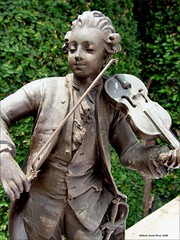
Music not only soothes the savage beast; it heals the critically ill.
A study in Critical Care Medicine evaluated the mechanisms of music-induced relaxation in critically ill patients. The researchers measured blood pressure and heart rate, brain electrical activity, serum levels of stress hormones and cytokines, requirements for sedative drugs, and level of sedation before and after an hour of listening to piano sonatas through headphones.
 Researchers found that patients who listened to the sonatas required less medication to achieve a comparable level of sedation, compared to those who didn’t.
Researchers found that patients who listened to the sonatas required less medication to achieve a comparable level of sedation, compared to those who didn’t.
One of the remarkable things about the study is that the researchers also found that serum levels of growth hormone went up after listening to music, while those of epinephrine and interleukin-6 went down. The levels of all three should decrease with lowered stress. The jury’s definitely still out on the mechanism by which this might occur, and bear in mind that this was an extremely small study: a total of just 10 patients in both intervention and control groups.
But not just any music will do. It has to be Mozart.
Another study compared the effect of listening to either Eine Kleine Nachtmusik or New Age music on relaxation states. Subjects were assigned to listen to either one for 28 minutes a day on three consecutive days. At the outset, all subjects scored similarly on the Smith Relaxation States Inventory.
On Day 2, Mozart listeners reported higher levels of a relaxation state called “At Ease/Peace” and lower levels of negative emotion. On Day 3, Mozart listeners reported substantially higher levels of the states of Mental Quiet, Awe and Wonder, Mystery, At Ease/Peace, and Rested/Refreshed than did those who listened to New Age music.
Researchers have demonstrated that listening to Mozart for ten minutes briefly improves performance on tests of spatial temporal reasoning and, most astoundingly, reduces epileptiform brain activity and clinical seizures. Mozart even works for mice. Those who were exposed to Mozart’s piano sonata K448 en utero and for 60 days after birth performed better at maze tests than mice who were exposed to silence, white noise, or music composed by Phillip Glass.
Computer analysis of the music of 58 composers revealed that Mozart was distinct in using long-term periodicity; that is, musical phrases lasting between 10 and 60 seconds with a definite beginning and end. Of all the music analyzed, only the Bach boys, J.S. and C.P.E., included similar periodicity.
Take two sonatas and call me in the morning.
References
Conrad, C., Niess, H., Jauch, K.W., Bruns, C.J., Hartl, W., Welker, L. (2007). Overture for growth hormone: requiem for interleukin-6?. Critical Care Medicine, 35(12), 2709-2713.
Hughes, J.R., Fino, J.J. (2000). The Mozart effect: distinctive aspects of the music–a clue to brain coding?. Clinical EEG, 31(2), 94-103.
Smith, J.C., Joyce, C.A. (2004). Mozart versus new age music: relaxation states, stress, and ABC relaxation theory. Journal of Music Therapy, 41(3), 215-224.
Source: Brain Blogger
 Monday, August 17, 2009 at 09:03PM
Monday, August 17, 2009 at 09:03PM 


 Researchers found that patients who listened to the sonatas required less medication to achieve a comparable level of sedation, compared to those who didn’t.
Researchers found that patients who listened to the sonatas required less medication to achieve a comparable level of sedation, compared to those who didn’t.